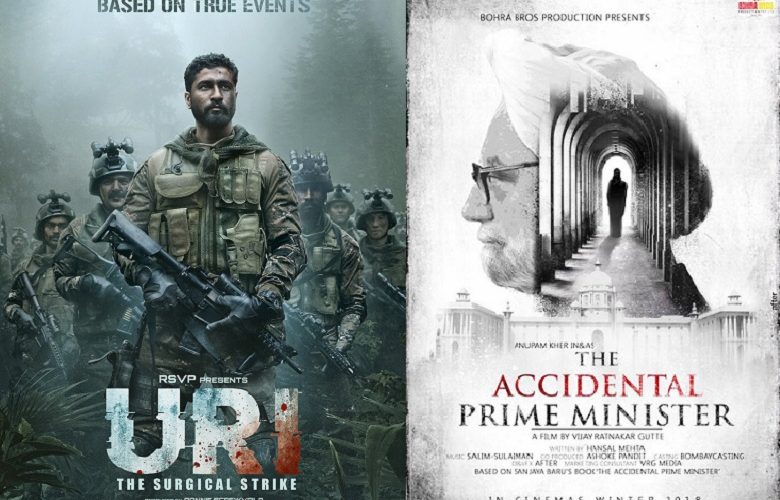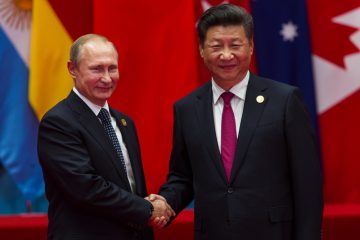Written By : Simran Saini
New Delhi, India
The second decade of the 21st century saw the beginning of a new era of the Hindi film industry – a range of new age films based on social issues, historical events, biopics and the like. It is indeed a breath of fresh air from the classic face of Bollywood which has always been about music, over-hyped family drama/ romance and iconic dance moves. The new avatar of Bollywood is raw, (almost) liberal and quite daring. This second decade has also seen quite a few movies based on politics at the box office. But the most interesting release(s) in the New Year are the ones that released on the 11th January 2019 – The Accidental Prime Minister and Uri: the Surgical Strike.
Although the former instantly and boldly reveals the plot and the protagonist, the latter might make you wonder why it is being associated with the former. The Accidental Prime Minister is a biopic and Uri: The Surgical Strike is an action film, both based on true events. But if you happened to watch both these films, you might know exactly where I’m going with this.
It is no surprise that the controversial decade (2004-2014) of the UPA government led by Prime Minister Manmohan Singh became the subject of a book titled ‘The Accidental Prime Minister’ by the famous Indian policy analyst Sanjaya Baru, who was also the Prime Minister’s media advisor from 2004-2008. But what must surprise the public in 2019 is the release of a film based on the same, just 3 months before the general elections are due!
Uri, on the other hand, is a film based on a particular event – the well-known 2016 Indian Line of Control Strike by the Indian army against in the Pakistan-administered Kashmir area. The film chronologically presents the events that led to the Surgical Strike and is an insider to the key decision making factors and figures that steered this decision.
If you happen to watch both films back to back (like I did), it is not too difficult to connect the dots. What seems like two films based on two different events, might very well have a connection that is not too difficult to decipher. One film chronicles the UPA government’s rule in a comic way – portraying the Prime Minister as nothing but a puppet in the hands of the most influential political family in India. The figure and authority of the Prime Minister are stooped down to the level of comedy – and so is that of the Congress Party’s President Rahul Gandhi. Akshaye Khanna, the narrator, playing the role of Sanjaya Baru is seen with a sarcastic smile throughout the film. One hour into the film, one can already understand that this is a big joke being played on one of the leading political parties of the country. A decade of Indian politics and the genius of an economist and politician like Manmohan Singh are turned into a joke.
On the other hand, Uri: The Surgical Strike, is a serious film. It is tragic and emotional at the same time, and the film justifies these emotions through the characters and dialogues. But after watching the Accidental Prime Minister in the afternoon, when I watched the last show of Uri, I couldn’t help but keenly observe the character of Prime Minister Narendra Modi as portrayed in this film. After hearing an audience of a packed cinema hall laughing at the former Prime Minister that afternoon, I couldn’t help but notice the seriousness of PM Modi’s character as shown in the film. Here was a Prime Minister heading critical committees, taking crucial decisions for the country, congratulating the Army officers in person, being considerate to their personal lives, all with an expression of intense seriousness on his face. Here was an audience feeling proud, cheering and clapping at the end of the film. A sharp contrast to the giggles and laughter I heard after the screening of The Accidental Prime Minister that afternoon.
Although Uri is a film about blood and war, the focus is not exactly the same throughout the film. Given the significant amount of screen time allocated to PM Modi (Rajit Kapur) and his national security advisor (Paresh Rawal), one can easily suspect the intentions of the film about the same. The film clearly glorifies the role of the ministers and their adherents involved in the build-up to the surgical strike, without exclusively focusing on the bloodshed and war. The recurrent appearance of committee discussions and the intense look on the Prime Minister’s face evidently intends to fill the audience with a sense of patriotic pride which sub-consciously registers in the minds of the audience as nothing but the success of the ruling government’s decisions, who are depicted as the pilots of this ‘Naya Hindustan’ (New India). In the case of Uri, a minor role is indirectly exalted. And in the case of The Accidental Prime Minister, a more serious role is overtly mocked. The role of a government led by the genius of an economist cannot and should not have been ridiculed the way it has been done in this film. The book under the same title which was published towards the end of PM Manmohan Singh’s rule might have had clear intentions to chronicle and state facts, but the recurring comic music in the film’s background does not do justice to it. The entire nation knows that the UPA government’s rule over the said decade was controversial and the silence of the PM was continuously questioned and seen as a weakness. These are facts. But the fact that the solemnity of a serious man is boiled down to ridicule in the Accidental PM, as against the more jolly public image of the present PM who is depicted as serious and commanding in Uri – this certainly leaves us with some doubts and questions.
Could this really be a coincidence then- Two films, about two different governments, one explicitly stating the obvious, and the other glorifying the present regime in a more implied manner? Is this not just another election gimmick, like the 10% quota for the ‘Economically Weaker Sections’? In a country where so many important bills remain pending with the parliament for years, a 10% EWS quota bill is passed within a short span, right before the elections? These ‘co-incidences’ clearly bring the true face of Indian politics to the forefront. For years, political parties have been trying to influence the public with promises springing from religion-based issues and caste-based politics. But what is happening now, in a decade where the public has easy access to media, using films to influence voters before elections, is a new kind of dirty politics. If political parties focused more on their manifestos and fulfilling their promises, rather than such election gimmicks to play with the minds of the public before elections, they might as well win our votes anyway!




